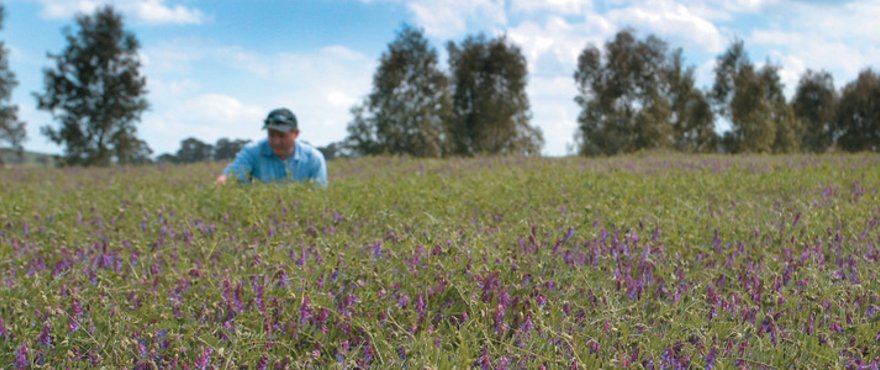Download a copy of the Haymaker Plus Woolly pod vetch factsheet.
Haymaker Plus woolly pod vetch (Vicia villosa) was derived from selections out of Namoi woolly pod vetch. It demonstrated mid maturity along with a semi erect growth habit. Haymaker Plus is suited to a wide range of soil types, performing better on lighter soil types, compared to other vetch species. It is well adapted to low rainfall situations and selected for its improved winter growth and dry matter production. Haymaker Plus is a very hard seeded variety that is suited to long term cropping rotations. It also provides the added benefits of moderate drought tolerance while also being a highly efficient and effective soil nitrogen producer. Mature plants form a dense canopy providing strong weed competition. Haymaker Plus is ideal as a break crop and is well suited for hay production or turned in as a green manure crop to improve soil health.
Key features
- Has greater total dry matter production than Namoi
- Very hard seeded (80–90%) for improved persistence
- Similar in maturity to Capello and RM4 (124) days (to flowering)
- Highly efficient nitrogen fixation
- Resistance to chocolate spot, rust and ascochyta
Key benefits
- Better adapted to light soils than other vetches
- Improved winter growth than Namoi
- Offers a disease break in cropping rotations
- Suitable for grazing, hay & green manuring
- Improves soil fertility for following crops
Pest resistance
Haymaker Plus, like all vetches is susceptible to red legged earth mites (Halotydens destructor), cow pea aphid (Aphis craccivora) and native bud worm (Helicoverpa punctigera) and appropriate control measures should be taken, especially in seedling stands.
Disease Resistance/Tolerance
Haymaker Plus has demonstrated resistance to chocolate spot (Botrytis), rust (Uromyces) and ascochyta (Ascochyta spp.). Haymaker Plus woolly pod vetch adds to the rotation by providing an excellent alternative crop for controlling cereal root diseases.
Agronomy and management
Regeneration: Haymaker Plus vetch produces 80–90% hard seed. This is advantageous for crop/pasture rotations that require long term persistence.
Grazing: Vetch is not suited to close grazing as their growing points are well above ground level. However in longer season environments, Haymaker Plus can be lightly grazed successfully during winter and early spring, provided that the growing points are not damaged. Heavy grazing can cause significant damage to the plant and it may not recover. Bloat can be a problem on pure legume stands and stock will have to be watched if grazing green vetch paddocks.
Disclaimer: The information presented in this brochure is from official and other sources and is considered to be reliable. It is provided in good faith and every care has been taken to ensure its accuracy. Barenbrug does not accept any responsibility for the consequences that may arise from the acceptance of recommendations or the suggestions made.


